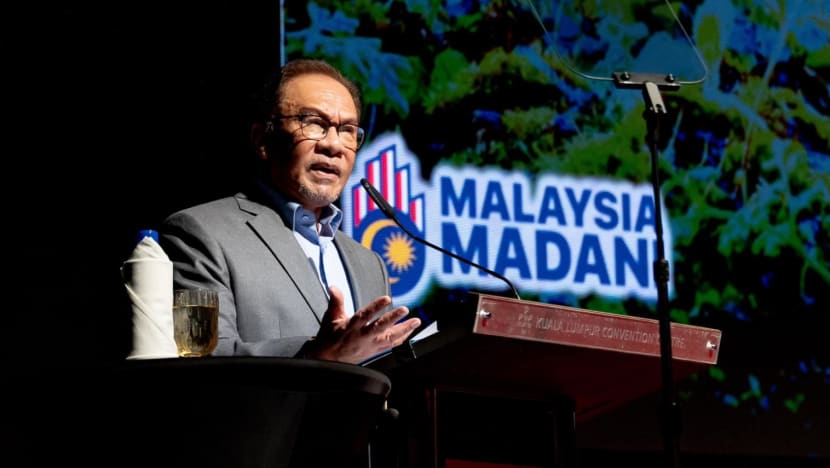Taxation measures in Malaysia must not burden people or businesses: PM Anwar

Malaysia Prime Minister and Finance Minister Anwar Ibrahim delivering his opening remarks at the National Tax Conference 2023 on Aug 1, 2023. (Photo: Facebook/Anwar Ibrahim)
KUALA LUMPUR: Malaysia Prime Minister Anwar Ibrahim said on Tuesday (Aug 1) that the country’s taxation policies must be guided by two fundamental principles, namely to tax when it is absolutely necessary and that it should not be considered a burden to taxpayers.
“The changes that we have to take, including in the upcoming (budget), will be clearly formulated based on the principles of ‘tax when it is necessary, and should never be seen as a burden for the public and business community’,” he was quoted as saying by Bernama during his opening remarks at the National Tax Conference 2023.
Malaysia’s Budget 2024 is scheduled to be tabled on Oct 13.
In March this year, Mr Anwar, who is also the finance minister, announced that the government has no plans to reintroduce the Goods and Services Tax (GST) within the year as the income level of Malaysians is still relatively low.
He also said then that the proposed taxes on capital gains and on luxury goods, as well as efforts to earn more income and implement strict measures against tax evasion, are a sufficient alternative to reintroducing GST.
During his speech on Tuesday, Mr Anwar stressed that while taxation is necessary, the government should not overtax and burden the people.
“Our intention is, of course, to encourage them to be more productive and contribute to the nation,” he said, according to Bernama.
He added that the government should ensure the taxes collected are spent wisely without leakages.
Mr Anwar also pointed out that foreign and domestic investors would see the country’s taxation system as an opportunity for business enterprise.
“This will not only reward them but at the same time, nurture the sense of belonging or sense of responsibility for them that is consistent with the concept of Madani,” he said, adding that even those who were deprived and marginalised would be able to compete and survive.
Madani refers to Mr Anwar’s slogan about reforming Malaysia into a country that believes in humanity and good values such as fair, just and effective governance.
According to the New Straits Times (NST), Mr Anwar said the government would continue its engagements with the Inland Revenue Board (IRB) for its input and suggestions on how to effectively undertake or adjust taxation policies, including the need to introduce new taxation measures.
Malaysia has about 130,000 hardcore poor people and many in the B40 (bottom 40 per cent income group) category, Mr Anwar told parliament in March this year.
He said then that the threshold of people’s income must increase before GST can be implemented.
Malaysia currently uses the Sales and Services Tax (SST) which was introduced in 2018 as a replacement to the GST.
Then-finance minister Lim Guan Eng had said that the SST would help reduce the cost of living as compared to the GST which was charged at various levels.
Under the current SST regime, which has a narrow tax base, there is a tax of between 5 per cent and 10 per cent on the sale of goods, while services attract a 6 per cent levy.
In comparison, the former GST regime covered a broader range of items and services with the rate set at 6 per cent. GST was introduced in April 2015 by former prime minister Najib Razak.
















